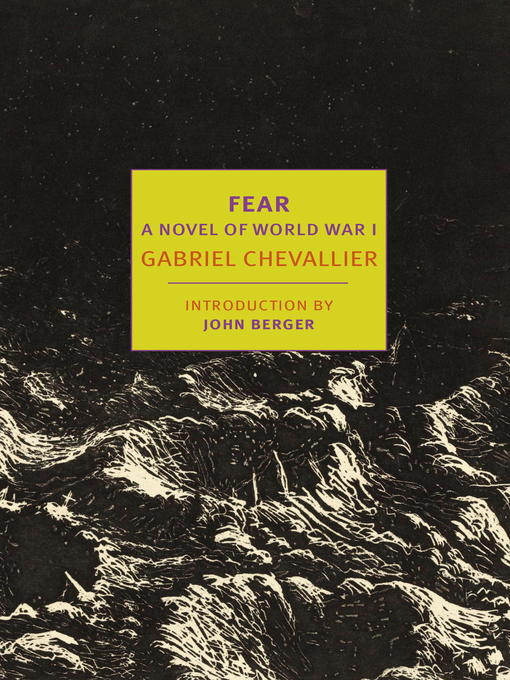
Fear
A Novel of World War I
کتاب های مرتبط
- اطلاعات
- نقد و بررسی
- دیدگاه کاربران
نقد و بررسی

Starred review from March 24, 2014
Chevallier’s (best known for Clochemerle) book, published for the first time in the U.S. with an award-winning translation by Malcolm Imrie on the centennial of World War I, represents that rarest of war narratives—one that is indispensable, nearly unprecedented, and painfully relevant. Based on Chevalier’s experiences on WWI’s front lines, the novel was met with controversy upon its original publication in France in 1930. The plot unfurls in linear war-story fashion: our “malcontent hero,” Dartemont, is unceremoniously dispatched to the trenches, “where rotting corpses serve as bait.” He’s subsequently wounded, and convalesces in a hospital among insane youths and acquiescent matrons, only to return home a changed man. There he is treated with baffled embarrassment by his family, and shipped back to the sustained nightmare of the front lines. What makes Chevallier’s book a masterpiece is the lucidity of the author’s eyewitness account; its prose moves from practical concerns like picking lice to poetic reverie in the space of a paragraph, capturing the chaos of war and the stillness of the battlefield, revealing a terrible beauty.

May 1, 2014
A French novel originally published in 1930 suggests that war is hell, in any century, in any country.The first American publication of this novel-by a French author known mainly as a satirist (Clochemerle, 1934)-marks the centennial of World War I. Its first-person narration by a young soldier who, like the author, was wounded in battle, hospitalized, returned to the front and remained an infantryman until the armistice reads like a cross between the darkest humor and the bleakest reportage. At the start, he seems clueless: "I was, in particular, very bad at marching." By the end, he has become hopeless: "I have fallen to the bottom of the abyss of my self, to the bottom of those dungeons where the soul's greatest secrets lie hidden, and it is a vile cesspit, a place of viscous darkness....I am ashamed of the sick animal wallowing in filth that I have become." In between, he witnesses an onslaught of carnage and death, matter-of-factly and often graphically, while caring little about whether he lives and almost welcoming death as an escape. His wound provides temporary respite: "A hospital is the promised land, the greatest hope for millions of men. And for all the pain and suffering and harrowing sights it can contain, it is still the greatest happiness that a soldier can imagine....After I've paid my debt of pain every morning (the cost of my board and lodging), I really do feel as if I'm on holiday." Chevallier (who died in 1969) said in the preface to a 1951 edition that he would have written the story differently later. But the themes of what he calls "this anti-war book" are timeless: the folly of nationalism, the foolish pomposity of military leaders, the arbitrariness of death, the madness of war.In tone, much of this novel feels very modern.
COPYRIGHT(2014) Kirkus Reviews, ALL RIGHTS RESERVED.

Starred review from April 15, 2014
Another gripping WWI novel? Written by a soldier-turned-author who fought in the trenches? How can this be, and why should readers care? Published in 1930, Fear was a sensation in France. The novel is told retrospectively through the voice of Dartemont, a cynical intellectual who enlists simply out of curiosity. From the shifting roles of grenadier, messenger, reconnoiterer, and hospital patient (the result of a light injury that brings him and readers barreling into the visceral horrors of war-torn soldiers), Chevallier's protagonist is a lightly disguised version of the author himself, tracing his own experiences as a soldier. There is no real plot here. A chronological burst of battle stories and vindictive reflections on the paradox of war, Fear is structurally similar to Ernst Jnger's Storm of Steel (1920), while readers of C'line (a contemporary of Chevallier's) will catch whiffs of the sardonic misanthropy that runs through Journey to the End of the Night (1932). Dartemont deconstructs the notions of duty and heroism and draws their origins in fear and ignorance while letting us rifle through his blood-stained sketchbook with images from a war that grows ever more distant in our memories.(Reprinted with permission of Booklist, copyright 2014, American Library Association.)

























دیدگاه کاربران